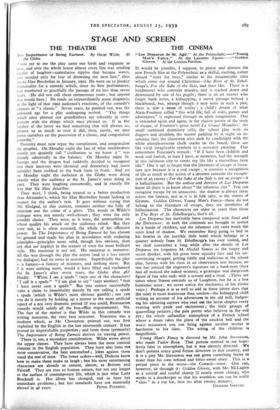STAGE AND SCREEN
THE THEATRE
The Importance of Being Earnest. By Oscar Wilde. At the Globe.
" AND yet to me the play came out fresh and exquisite as ever, and over the whole house almost every line was sending
ripples of laughter—cumulative ripples that became waves, and receded only for fear of drowning the next line," thus wrote Max Beerbohm in January, 1902. He went on to predict immortality for a comedy which, since its first performance, had weathered so gracefully the passage of no less than seven years. (He did not call them momentous years ; but anyone else would have.) He made an extraordinarily acute diagnosis, in the light of that 1902 audience's reactions, of the comedy's chances as " a classic." Seven years, he pointed out, was the awkward age for a play undergoing revival. " The things which once pleased our grandfathers are tolerable in com- parison with the things which once pleased us. If in the lumber of the latter we find something that still pleases us, pleases us as much as ever it did, then, surely, we may preen ourselves on the possession of a classic, and congratulate posterity."
Posterity must now repay the compliment, and congratulate the prophet. On Monday night the fate of what stockbrokers stoutly yet quaintly call " civilisation as we know it " was already admittedly in the balance. On Monday night St. George and the dragon had suddenly decided to recognise that their interests were identical and democracy had (most unfairly) been stabbed in the back from in front. And yet on Monday night the audience at the Globe were doing exactly what the audience at the St. James's were doing in 1902. They were laughing consumedly, and in exactly the way that Sir Max describes.
They were, I think, being treated to a better production than Alexander's, which Sir Max Beerbohm found lacking in respect for the author's text. It goes without saying that Mr. Gielgud, in this context, commits neither the folly of omission nor the crime of a gloss. The words in Wilde's dialogue were not merely well-chosen ; they were the only possible choice. They were, as it were, the ammunition on whose quality his attack on the audience relied. But they were not, as is often assumed, the whole of his offensive power. In The Importance of Being Earnest he has chosen his ground and made his plan in accordance with enduring principles—principles more solid, though less obvious, than any that are implicit in the texture of even the most brilliant style. His mainstay is not wit. His mainstay is nonsense. All the way through the play the action (and to a less extent the dialogue) had its roots in nonsense. Superficially the play is a fantasy—a fantasy of manners, and nothing more. But if it were nothing more, would it have filled and enchanted the St. James's after seven years, the Globe after 46? Hardly. "When I see a spade " (says one of the characters) " I call it a spade." " I am glad to say " (says another) " that I have never seen a spade." But you cannot successfully stake a claim to immortality merely by not calling a spade a spade (which is Wilde's most obvious gambit) ; nor can you do it merely by holding up a mirror to the most artificial aspect of a not very dramatic period (if you could, Restoration comedy would satisfy all the box-office requirements). No. The fact of the matter is that Wilde in this comedy was writing nonsense, the very best nonsense. Nonsense was a medium which, as Mr. Chesterton pointed out, was first exploited by the English in the late nineteenth century. It has proved its imperishable properties ; and from them (primarily) The Importance of Being Earnest derives its staying power.
There is, too, a secondary consideration. Wilde wrote about the upper classes. They have always been the most comical element in the English population. They have also been the most conservative, the best entrenched ; jokes against them stand the test of time. The lower orders—well, Dickens knew how to make them make us laugh ; but his most entertaining characters are already as remote, almost, as Bottom and Falstaff. They are true to human nature, but not any longer to the surface of contemporary life, which is just what Lady Bracknell is. Her idiom has changed, and so have her immediate problems ; but her standards have not materially








































 Previous page
Previous page